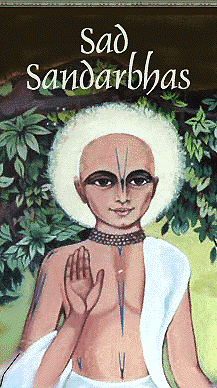
BY: SUN STAFF
Dec 17, CANADA (SUN) —
Tattva Sandarbha
by Srila Jiva Goswami
SECTION TWENTY-ONE
And the Garuda Purana states: The Purana called the Srimad Bhagavatam is the most complete. It explains the meaning of the Brahma sutras; it determines the meaning of the Mahabharata; it is the commentary on Gayatri; it explains and expands the meaning of the Vedas; it is the Samaveda of the Puranas; and it emanated from the Supreme Lord Himself. It has twelve cantos, hundreds of divisions or chapters (335), and eighteen thousand verses.
"It explains the meaning of the Brahmasutras." Brahma-sutra-namarthah means it is the natural commentary on them. First it appeared in a short form in the heart of Sri Vyasadeva, who then summarized it in the form of sutras. Later he expanded it into the form of Srimad Bhagavatam itself. Since it represents the natural commentary on the Vedanta Sutras, only those commentaries that agree with Srimad Bhagavatam are to be respected.
"It determines the meaning of Mahabharata": "The Mahabharata is glorified as containing the conclusion of all the scriptures. Previously, at the command of Srila Vyasa, all the demigods, including Lord Brahma, and all the great sages came together. They weighed the Mahabharata and the Vedas and the Mahabharata, because of its greatness and heaviness, weighed more than the Vedas, therefore, it is called Mahabharata." (Mahabharata, Adi Parva 1.272-274)
The essential meaning of the Mahabharata is contained in the Srimad Bhagavatam. The meaning of the Mahabharata also culminates in the Supreme Lord alone. Thus in the Narayaniya section of the Mokshadharma portion of Mahabharata, Janamejaya says to Srila Vyasadeva: "O Brahman, O abode of austerities, just as butter is churned from yogurt, as sandalwood is extracted from the Malaya mountains, as the Upanishads from the Vedas, and as nectar from herbs, similarly you have churned the ocean of the highest knowledge with the rod of intelligence and extracted this (the Narayaniya) from the hundred thousand verses of the Mahabharata. It is related to Lord Narayana and sweet like nectar, (Mahabharata, Mokshadharma 170: 11-14).
Sri Jiva Toshani Commentary
The Srimad Bhagavatam is one of the eighteen Puranas, but Srila Vyasadeva wrote it after composing the Vedanta Sutra, which was composed as the essence of the Vedas, Mahabharata, and the eighteen Puranas. So all the eighteen Puranas were already compiled. Does this mean that the Srimad Bhagavatam is the nineteenth Purana?
Srila Jiva Goswami says no. First Srimad Bhagavatam appeared in a concise form, as one of the eighteen Puranas. Based on this initial edition, Srila Vyasa composed Vedanta Sutra. Later on, when He sat in trance after the order of Narada Muni, the expanded form of the Srimad Bhagavatam was revealed to Him as the natural commentary on Vedanta Sutra. They both have the same subject, the Absolute Truth and they express the same sambandha (relationship), abhideya (process), and prayojana (goal). Later on many acaryas and scholars wrote commentaries on Vedanta Sutra, but only those explanations that agree with the Srimad Bhagavatam, such as given by Ramanujacarya, Madhvacarya, and Baladeva Vidyabhushana are bonafide.
The hint that Veda Vyasa composed two editions of the Srimad Bhagavatam has been given by Veda Vyasa, ( SB.1.7.8):
"The great sage, Vyasadeva, after compiling the Srimad Bhagavatam and revising it, taught it to his own son, Sri Sukadeva Goswami, who was already absorbed in self-realization." Commenting on this verse, Srila Visvanatha Cakravarti Thakura writes, atastadaiva purva-nirmitasyaiva sribhagavatasyanu-kramanam "The word "anukramya" in this verse means that Veda Vyasa compiled the new edition of the already existing Srimad Bhagavatam."
The Mahabharata has been shown to be physically heavier than the Vedas. This is because in Mahabharata the cryptic subject matter of the Vedas has been expanded and lucidly explained using simple narrations. Vyasadeva makes this point in the Mahabharata (Adi Parva 1.62):
Srila Vyasadeva said, "O Lord Brahma! I have included the secret essence of all the Vedas and all other scriptures in this great work. It includes a detailed explanation of the meanings of the six limbs of the Vedas and the Upanishads."
Originally the Mahabharata had six million verses, but at present only one hundred thousand are available on this Earth. The rest is on the higher planetary systems, where people have suitable life spans and memories to absorb it. This is stated in the Adi Parva of the Mahabharata(1.106,107)
"After that Srila Vyasadeva compiled another Samhita (Mahabharata) containing six million verses. Out of this three million exist in the heavenly planets 1.5 million in the planet of the manes and 1.4 million on the planet of the Gandharvas. The remaining one hundred thousand verses are available among the human beings."
Though abridged, the version on this planet is in the Guinness Book of World Records as the longest epic ever. So due to the weightiness of the subject matter (maha-ttva) and its physical weight (bhara-ttva) it is known as Mahabharata.
The Mahabharata is more versatile than the Vedas because it does not have the restrictions that apply to the Vedas. All interested parties regardless of gender or social position may read and relish Mahabharata, but only the Mokshadharma portion is directly related to Lord Narayana. Other sections are mixed with topics such as kamya karma, polity, charity, and so on. By contrast, in Srimad Bhagavatam, all topics tangential to the glories of the Supreme Personality of Godhead are left out. The entire Bhagavatam speaks only and directly about the glories of the Supreme Lord, therefore it is superior to the Mahabharata. Hence the statement "The Srimad Bhagavatam determines the meaning of the Mahabharata" (bharatarthavinirnaya).
In the next section, Srila Jiva Goswami gives further proof of the Bhagavatam being the essence of all Vedic literatures and the topmost pramana.
Go to Section Twenty-Two
Return to Section Twenty
